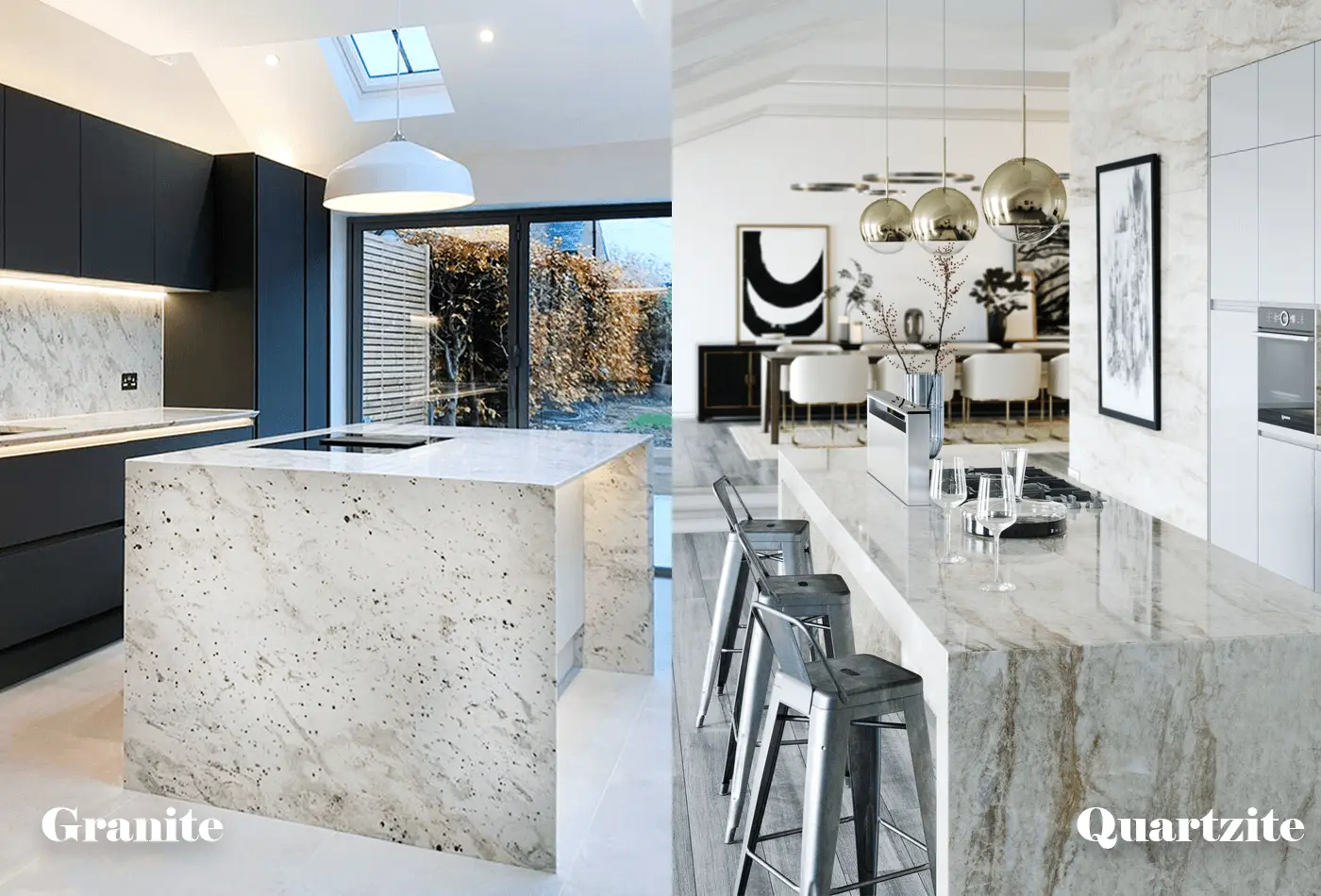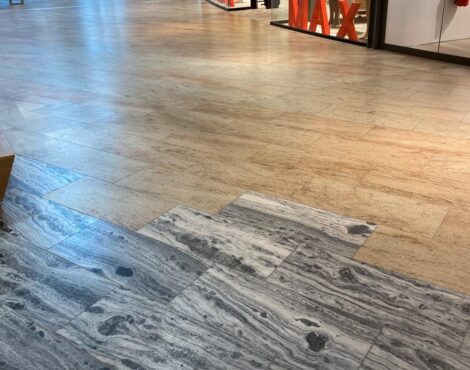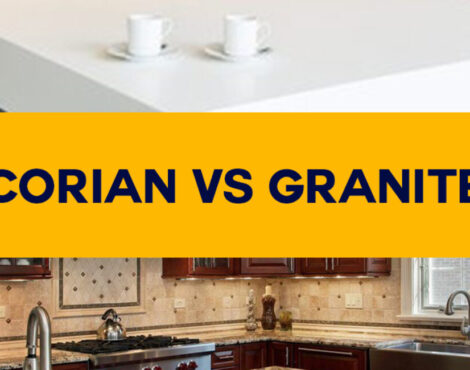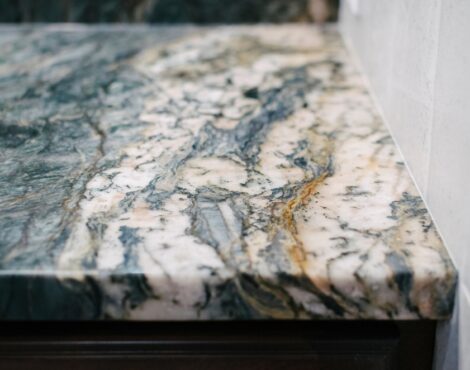Are you considering natural stone for your premise but feeling overwhelmed by the multitude of options available? Incorporating natural stone into your building can add a touch of elegance and sophistication however, when faced with choices like quartzite vs. granite, the decision-making process can feel overwhelming. If you’re looking for guidance on which option is best suited for your needs, look no further. In this comprehensive comparison, we’ll delve into the differences between quartzite and granite, covering everything from durability and maintenance to aesthetics and cost. Whether you’re drawn to the bold textures of granite or the understated elegance of quartzite, understanding the unique characteristics of each material will empower you to make an informed decision. So, let’s dive in and explore which option is the perfect fit for your home!
READ | The Reason for Material Selection: Engineered Stone Vs Natural Stone
Quartzite and granite are both popular choices, but they have distinct differences that may influence your decision. Here’s a breakdown of the key contrasts between the two, along with considerations to help determine which option is better for your needs:
Composition of Granite & Quartzite:
-
- Granite: Granite is a natural stone composed primarily of quartz, feldspar, and mica, along with other minerals. It is formed through the slow crystallization of magma deep within the Earth’s crust.
- Quartzite: Quartzite is a metamorphic rock that originates from sandstone. It is primarily composed of quartz grains that have been recrystallized under intense heat and pressure.
READ | Quartzite Countertops: The Ultimate Countertop Material
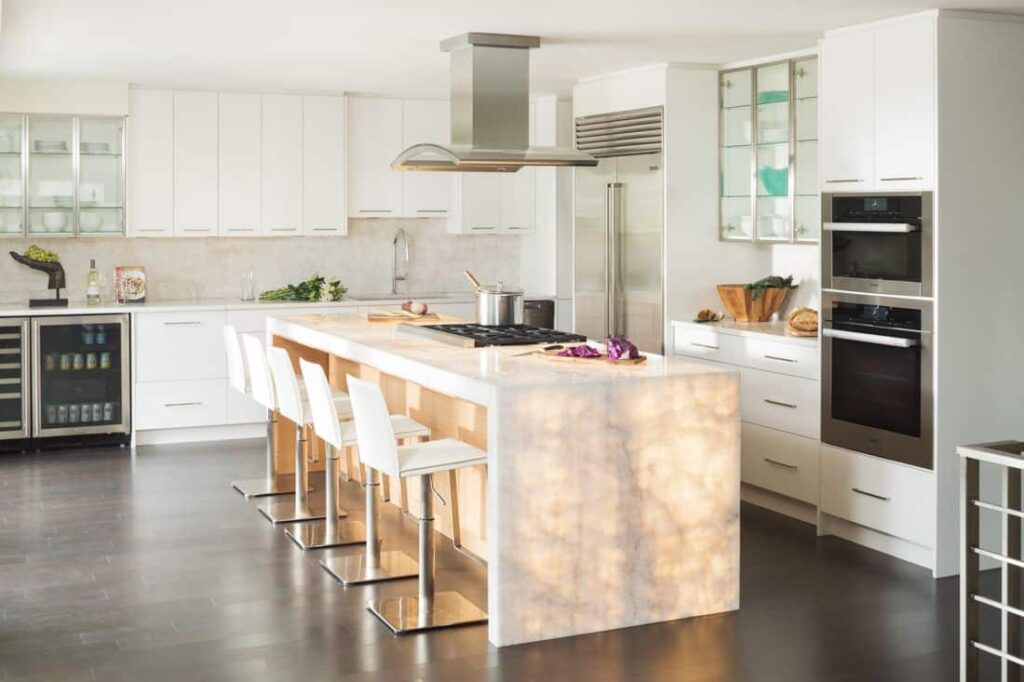
How are Granite and Quartzite Different in Appearance?
-
- Granite: Granite typically has a speckled appearance due to the various minerals present in its composition. It comes in a wide range of colours and patterns, offering unique and natural aesthetics.
- Quartzite: Quartzite often has a similar appearance to marble, with light-coloured backgrounds and subtle veining. It has a sophisticated and elegant look that appeals to many homeowners and designers.
Both quartzite and granite offer a diverse array of colour options, providing ample choices for residential as well as commercial applications. In addition to the classic neutrals like white, grey, and brown, quartzite expands the palette with shades ranging from pink, blue, and orange to green, red, yellow, and purple. Similarly, granite presents a wide spectrum of hues, including black, white, grey, brown, and beige, with bold choices in red, yellow, blue, and green. While both stones offer a plethora of colours, granite often boasts a more pronounced texture with striking veining and speckling on its slabs.
Quartzite and Granite’s Durability
-
- Granite: Granite is known for its durability and resistance to scratches, heat, and stains. With proper sealing and maintenance, it can withstand the rigours of daily use.
- Quartzite: Quartzite is also highly durable and resistant to scratches and heat. It is harder than granite and less prone to etching from acidic substances, making it suitable for high-traffic areas.
Granite & Quartzite Hardness
The durability of natural stone is typically assessed using the Mohs Hardness Scale, which ranks materials from 1 to 10 based on their hardness. On this scale, where 10 represents the hardest material, granite typically falls within the range of 6 to 7, while quartzite registers at around 7.
Both granite and quartzite are renowned for their durability, making them suitable choices for high-traffic areas like bathrooms and kitchens. However, quartzite typically surpasses granite in hardness and overall durability. This slight advantage in hardness and durability makes quartzite an appealing option for those seeking long-lasting surfaces that can withstand daily use and wear.
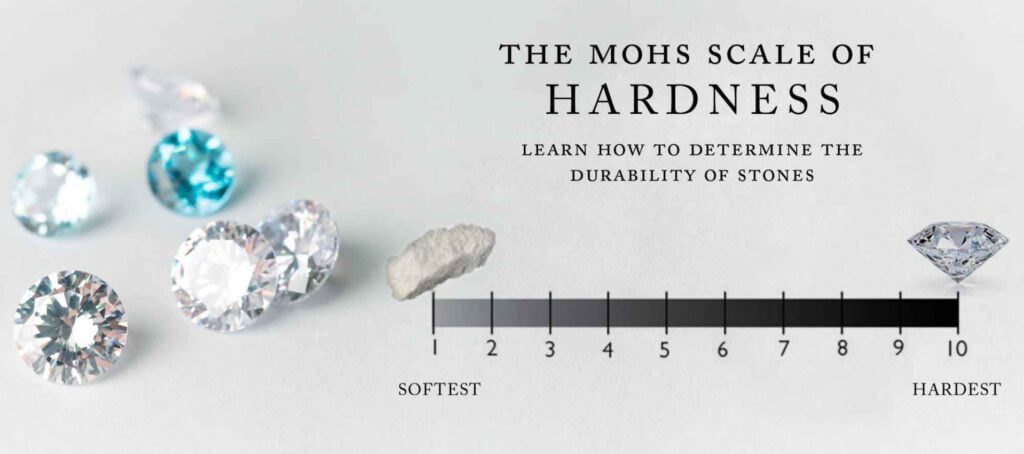
Maintenance of Granite vs. Quartzite
-
- Granite: Granite countertops require periodic sealing to protect against stains and maintain their appearance. Regular cleaning with mild soap and water is recommended to keep them looking their best.
- Quartzite: Quartzite countertops are generally low-maintenance and do not require sealing. Routine cleaning with soap and water is usually sufficient to keep them clean and hygienic.
Granite vs Quartzite Price
-
- Granite: Granite countertops are typically less expensive than quartzite, making them a budget-friendly option.
- Quartzite: Quartzite countertops tend to be more expensive due to the rarity of the stone and the labour and technology-intensive process involved in its extraction and fabrication.
Is Quartzite Or Granite Better? Final Thoughts
While granite and quartzite share many similarities, the best choice depends on your individual preferences and needs. If you’re seeking bold texture and striking patterns, granite may be the way to go. On the other hand, for those who prefer a more understated elegance, quartzite offers a timeless charm. Ultimately, consider your colour preferences, maintenance requirements, and budget constraints to make the decision that best suits your style and the desired ambience.
Frequently Asked Questions (FAQs)
Is quartzite more expensive than granite?
Yes, quartzite typically carries a higher price tag compared to granite. The cost variation may depend on factors such as rarity, colour, and quarry location. Due to its unique qualities and higher demand, quartzite is generally priced higher than granite.
Is quartzite better than granite?
Whether quartzite is better than granite depends on your specific needs and preferences. Quartzite tends to be slightly harder and more durable than granite, making it a popular choice for high-traffic areas like kitchens and bathrooms. However, granite offers its advantages, such as a wide range of colours and patterns, and may be more budget-friendly in some cases. Ultimately, the best choice between quartzite and granite will depend on factors such as your lifestyle, design preferences, and budget constraints.
Is quartzite stronger than granite?
Yes, quartzite is generally considered to be slightly stronger than granite. With a higher rating on the Mohs scale of mineral hardness, quartzite is more resistant to scratches and abrasion compared to granite. However, both materials are highly durable and suitable for use in various applications.
Is quartzite as durable as granite?
Yes, quartzite is considered to be as durable as granite. Both materials are highly resilient and capable of withstanding the demands of daily use in areas like kitchens and bathrooms. While quartzite may have a slight edge in hardness, both granite and quartzite are excellent choices for durable and long-lasting surfaces.
Is quartzite more porous than granite?
No, quartzite is typically less porous than granite. While both materials are natural stones and have some level of porosity, quartzite tends to be denser and less porous than granite.

